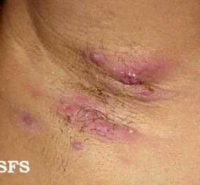21 Jul Drugs That Target Th17 Cells Can Improve Debilitating Skin Disease Hidradenitis suppurativa
MedicalResearch.com Interview with:
Dr Jean Fletcher
Assistant Professor
Schools of Medicine and Biochemistry & Immunology
Trinity College Dublin, the University of Dublin
Dublin, Ireland
MedicalResearch.com: What is the background for this study? What are the main findings?
Response: Hidradenitis suppurativa (HS) is an inflammatory skin disease which causes deep, painful lesions in areas such as the underarms and groin. 1-4% of people are thought to suffer from the disease, however as it is under recognised and often misdiagnosed these may be conservative estimates. The pain and distress associated with HS leads to a poor quality of life with many patients experiencing depression.
Current interventions include combinations of antibiotics, surgery to remove lesions and more recently the use of the biologic therapies such as TNF inhibitors; however these are often ineffective and there is a pressing need for more effective treatments.
The cause of Hidradenitis suppurativa is unknown, however there are known risk factors which include smoking and obesity, and there is an association with inflammatory bowel disease, which suggests that dysregulation of the immune system may play a role.
MedicalResearch.com: What is the background for this study? What are the main findings?
Response: Our research team found that inflammatory Th17 cells were the dominant immune cell in Hidradenitis suppurativa patient skin, even in skin peripheral from lesions. The usual balance that exists between these Th17 cells and regulatory T cells, which act as brakes for the immune system, was highly dysregulated. Hidradenitis suppurativa patients treated with anti-TNF therapy showed approximately 60% improvement and this was associated with a reduction in Th17 cells, suggesting that these cells are important in mediating inflammation in Hidradenitis suppurativa.
MedicalResearch.com: What should clinicians and patients take away from your report?
Response: The study suggests that targeting Th17 cells may be a therapeutic option for Hidradenitis suppurativa. Various drugs that target Th17 cells in different ways have been highly successful in another inflammatory skin disease psoriasis, where Th17 cells appear to be involved. Our findings suggest that drugs targeting the Th17 pathway may also be an option here.
MedicalResearch.com: What recommendations do you have for future research as a result of this study?
Response: We need to have a better understanding of the pathogenesis of Drugs That Target Th17 Cells Can Improve Debilitating Skin Disease Hidradenitis suppurativa as it is still poorly understood. As there is no mouse model for the disease, future studies will need to focus on careful and sophisticated analysis of skin biopsies from patients to understand the complex interactions that lead to inflammation and how these can best be targeted.
MedicalResearch.com: Is there anything else you would like to add?
Response: The research team include Barry Moran at Trinity College Dublin, Professor Brian Kirby at St. Vincent’s University Hospital, and Dr Anne-Marie Tobin at Tallaght Hospital, all in Ireland. Disclosures: Prof. Fletcher has received honoraria from Novartis and research funding from Abbvie, Dr Tobin from Abbvie, and Prof. Kirby from MSD, Pfizer, Abbvie, and Janssen. The research was funded by the British Skin Foundation.
MedicalResearch.com: Thank you for your contribution to the MedicalResearch.com community.
Citation:
Barry Moran, Cheryl M. Sweeney, Rosalind Hughes, Anna Malara, Shivashini Kirthi, Anne-Marie Tobin, Brian Kirby, Jean M. Fletcher. Hidradenitis suppurativa is characterised by dysregulation of the Th17:Treg cell axis, which is corrected by anti-TNF therapy. Journal of Investigative Dermatology, 2017; DOI: 10.1016/j.jid.2017.05.033
Note: Content is Not intended as medical advice. Please consult your health care provider regarding your specific medical condition and questions.
Last Updated on July 21, 2017 by Marie Benz MD FAAD

